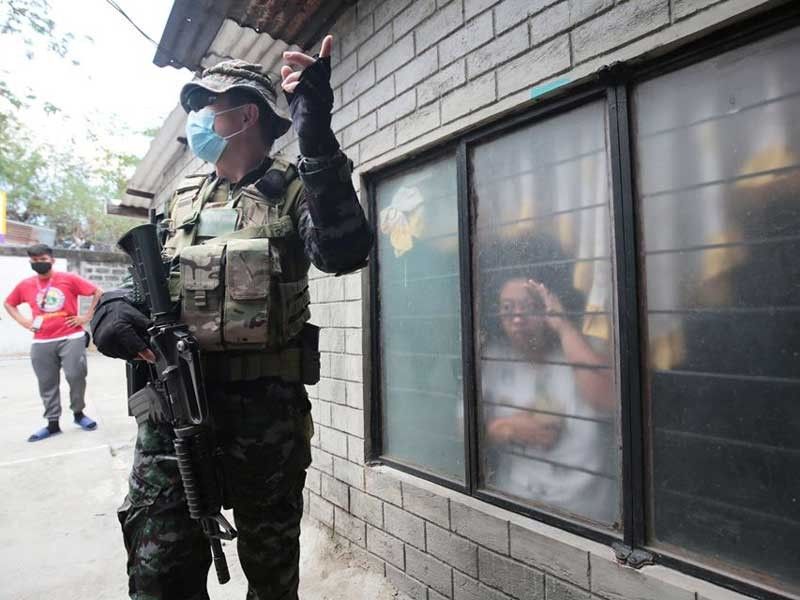Coping in quarantine: Lockdown as a literal anti-anxiety pill to swallow

Part 1 of a two-part feature. Read Part 2 here.
MANILA, Philippines (Updated June 2, 2020, 6:09 p.m.) — Digital marketing professional *Marianne did not think the lockdown would affect her that much. After all, she said, she is used to being “cooped up at home” due to the nature of her job and partly due to being an introvert.
Marianne said she had been staying with her family even before the pandemic hit, and for the earlier period of the lockdown, things seemed pretty normal. Until she realized that "meeting up with friends was usually the only thing I look forward to every week" and that that weekly ritual would be impossible indefinitely.
“That made me sad,” Marianne told Philstar.com in an e-mail.
She shared that she has been diagnosed with generalized anxiety disorder and Attention Deficit Hyperactivity Disorder.
The 29-year-old digital marketing professional is one of the millions of Filipinos forced into the confinement of their homes since March 15 following the government's drastic bid to minimize movement and contain the spread of the deadly coronavirus. Close to three months later, the lockdown in the Philippines has been described as among the longest and most strict.
Early days easier due to fear of virus
At least 12 million Filipinos were given just three days to prepare before the government enforced the Luzon-wide lockdown— initially announced to run for a month —on March 15.
Although the public’s enforced confinement was abrupt, the fear of contracting the deadly coronavirus "may have been strong enough to make the people adjust and cope with it," Dr. Aileene Nepomuceno told Philstar.com in an e-mail.
Nepomuceno is a clinical associate professor at the UP Philippine General Hospital Department of Psychiatry and Behavior Medicine. She also holds consultations at the UP PGH Qualimed, Cardinal Santos Medical Center and the Medical Center Manila.
This held true for Marianne, who said that her “paranoia” over contracting the coronavirus also kept her from making a trip to the convenience store just to "get out of the house."
But, as the lockdown wore on, anxieties over "missing out" and over financial security soon bubbled to the surface.
"The extension of the lockdown... may have caused some people to react with more anxiety or depression as jobs and finances became unstable, 'fake news' proliferated, and supplies of essential goods went down,” Nepomuceno explained.
These feelings compounded the fear over the coronavirus that has been spreading in the country and has infected millions globally.
Even if the government moves to further ease restrictions by the end of May, the forced confinement of the National Capital Region will still have run longer than that imposed on Wuhan — the city in Hubei, China that was the epicenter of the pandemic.
Dr. Pamela Jean Pascual, for her part, said: “Staying at home without assurance or certainty for how long the quarantine will be could have served as challenges to one's mental health and coping.”
Pascual is a psychiatrist at the UERM Hospital and Queen Mary Help of Christians in Cardona, Rizal.
Heightened worry for many patients
For those living with anxiety and depression disorder, the lockdown also took on a literal form of a pill to swallow.
Those with anxiety disorder "experienced a heightened sense of worry over contracting the illness or transferring it to their loved ones," Nepomuceno said.
While those with depression "began feeling more sad at the state of the world and thought about being in the frontlines so they can contract the illness and die," she added.
Pascual pointed out coping mechanisms for these patients might not be as effective as they were before the lockdown, “since the environment where they are is limited to the confines of their homes."
"The patients are faced with a challenge on how they will get by their negative thoughts and feelings now that we are on a quarantine situation," she said.
Sleeplessness, restlessness and overthinking
Pascual said most of her patients who consulted with in the months of the quarantine said they experienced "persistence of depressed mood, feeling restless, insomnia, overthinking that they might have contracted coronavirus, inability to work and not having enough money to purchase medications."
She said she also had new patients "who reported experiencing depression and anxiety for the first time since the quarantine was instituted."
With the lockdown in effect and outpatient hospital operations drastically reduced, many have had to cope through tele-medicine consultations.
Marianne said she had her first online consultation with her psychiatrist on March 22, the first week of the lockdown. Her doctor prescribed a higher dosage of anti-depressants and put her on tranquilizers again — she had been off the drug for a year — since March.
Nepomuceno said since the shift to virtual consultations, "from zero new consults in March, come May, the number of my personal consults tripled."
"Some experienced severe difficulty being cooped up at home and became increasingly suicidal," Nepomuceno said.
Marianne admitted that uncertainties and changes due to the virus have aggravated her anxieties.
"The uncertainties we’re facing — personally with my job and the pay cut I had to take — and everything that kept getting cancelled because of the virus really drove my anxiety through the roof," she said.
Marianne said the concerts she had been looking forward to and trips that have since fallen though through were her sources of joy — and the pandemic took these away.
The tranquilizers and anti-depressents helped her cope better, she said. "I am somewhat calmer — with the help of yoga and meditation and exercise — but being that I have an anxiety disorder, it's really just about taking it one day at a time."
"Some days are better than others... I still see my psychiatrist once a month and while there are no major breakthroughs, she has taught me to embrace 'radical acceptance' (of this new reality), I'm struggling but coming to terms with it," Marianne added.
*Marianne is a pseudonym to protect her privacy.
Editor's note: In response to this story, Project Listen by Coach Tine has offered services for those who are in the same boat as “Marianne” and need someone to talk about their anxiety, panic and depression. Coach Tine said “Marianne's" may reach out through Facebook.
- Latest
- Trending






























